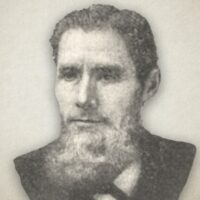
The Fraudulence Of The Fulton Confession
A Note From The Editor:
[It was during the 1830’s that the American Particular Baptist churches formerly split into two recognizable groups. Those remaining faithful to the teachings represented by John Gill became known as the Old School or Primitive Baptists, while those adopting the newfangled teachings of Andrew Fuller became known as the New School or Missionary Baptists.Between the 1830’s and 1860’s, the Primitive Baptists were of one mind with their English Particular Baptist counterparts. However, between the 1860’s and early 1900’s, a split emerged between the Primitives. Those who remained faithful to the teachings represented by Gill became known as Absoluters (since they believed in the doctrines of absolute predestination and the oneness of saving grace), while the others who departed from the teachings became known as Conditionalists (since they believed in limited predestination and dichotomized salvation into ’eternal’ and ‘time’ categories).
In an attempt to legitimize their new set of teachings, and vindicate themselves as the representatives of the historic faith, the Conditionalists met together at a “national convention” convened at Fulton, Kentucky in the year 1900. They selected the 1689 Baptist Confession as the basis on which they would affirm their faith. However, since the 1689 confession affirms the doctrines of absolute predestination and the oneness of saving grace, they chose to insert footnotes at the end of those articles with which they disagreed. In the Preface to their document, they argued the language of the 1689 confession is archaic and ambiguous, standing in need of explanation and clarification, thereby allowing them to change the meaning of the old confession. However, in the Appendix, they acknowledged the 1689 confession was actually in error as it relates to absolute predestination and the oneness of saving grace. Henceforth, while the reader of the Fulton Confession is led to believe at the beginning that the Fulton Confession is in full agreement with the 1689 confession, yet at the end the reader is informed the Fulton Confession is in disagreement with the 1689 confession. The Fulton Confession, therefore, deceptively attempts to convince the reader that the Conditionalists represent the historic faith.
In the article which follows, David Bartley (an Absolute Primitive Baptist) correctly identifies the teachings of the1689 confession to be congruent with the doctrines of absolute predestination and the oneness of salvation, pointing out the inconsistencies of the Conditionalists.—Jared Smith]
Signs Of The Times:
Dear Brethren In The Faith Of God:—As the plea has been made that the meaning of English words, though plain and clear when used, yet becomes dark and obscure in later times, so it is with the declaration of the religious belief of the Baptists of the seventeenth century, in the year of our Lord, 1651), and published in the London Confession. And as this doubtful meaning of this ancient declaration of what the holy Scriptures teach was made the plea for holding what was called a “National Convention “of “leading Baptists “of the United States, last November, at Fulton, Ky., for the purpose of adding a supplement to the London Confession, to make plain and clear the meaning of some of its obscure parts, therefore it is well that we read for ourselves the words of our faithful brethren of more than two hundred years ago, upon some of the chief points said to be obscure and uncertain in meaning. So the following correct extracts from the Confession are given. In their address to the reader they say, “In those things wherein we differ from others, we have expressed ourselves with all candor and plainness. “We have also taken care to affix texts of Scripture for the confirmation of each article in our confession, in which work we have studiously endeavored to select such as are most clear and pertinent for the proof of what is asserted by to.” How does this agree with the recent pretext that those devout servants of God failed to make their meaning plain to the intelligence of Baptists of this time? This is casting reproach upon those faithful men of God, as well as charging ignorance and stupidity to the Baptists of our time, for it is virtually saying that the common reader now cannot understand the real meaning of candid and plain words. It is a vaunting assumption on the part of a few self-styled “leading Baptists,” and it betrays a lack of “candor and plainness “before God and men.
In chapter two, speaking of God, the Confession says, “Who is immutable, eternal, incomprehensible, almighty, every way infinite, most holy, most wise, most free, most absolute, working all things according to the counsel of his own immutable and most righteous will, for his own glory. He is the alone fountain of all being, of whom, through whom and to whom are all things; and he hath most sovereign dominion over all creatures, to do by them, for them or upon them whatsoever himself pleaseth. In his sight all things are open and manifest. His knowledge is infinite, infallible and independent upon the creature, so as nothing is to him contingent or uncertain. He is most holy in all his counsels, in all his works and in all his commands.” All these statements are very candid and plain, and they need no master to explain them.
In chapter three those candid and plain men of God speak of God’s decree, saying, “God hath decreed in himself from all eternity, by the most wise and holy counsel of his own will, freely and unchangeably, all things whatsoever come to pass; yet so as thereby is God neither the author of sin, nor hath fellowship with any therein; nor is violence offered to the will of the creature, nor yet is the liberty or contingency of second causes taken away, bat rather established, in which appears his wisdom in disposing all things, and power and faithfulness in accomplishing his decree.” The simple meaning of this sentence is so frank, candid and plain to the mind of every reader, that it will stand against the efforts of every modern convention of “leading Baptists“ to doctor and obscure it to suit modern theology. Every child in the kingdom of God’s grace as well knows the clear sense of this declaration of faith in the sovereign power and wisdom and holiness of the omnipotent and unchangeable God as does any teacher in Israel, so that no recent footnotes added to it can explain it away or disguise the plain meaning of those solemn words of wisdom. They are based upon Scripture proofs, which are omitted here for brevity; and in this one sentence on the holy decree of God is most plainly declared just the candid belief of all who humbly and devoutly revere God as at once almighty and holy. These simple words of those godly men of old do most clearly repel the false accusation, that this solemn and scriptural belief in the complete sovereignty of the Holy One makes him the author of sin, and his holy decree the cause of the wicked acts of ungodly men. Arminian opposers of God’s sovereignty have ever made this slanderous charge, which is nothing but replying against God and condemning the Almighty, but not till recently have professed Predestinarian Baptists joined in this slanderous report against the unlimited decree of God, that it makes him the author of and responsible for all the things he has embraced in his changeless counsel, purpose and decree. Faithful Paul has met all such false inferences when he says, “Thou wilt say then unto me, Why doth he yet find fault! For who hath resisted his will!” He refutes the slander and rebukes the false accuser when he adds, “Nay but, O man, who art thou that repliest against God? Shall the thing formed say to him that formed it, Why hast thou made me thus!” This is just what all such “things“ do say when they speak thus against God. Who are men who thus rail against the Most High? Hear the answer of God: “All nations before him are as nothing; and they are counted to him less than nothing, and vanity.”
In chapter five of the London Confession, upon Divine Providence, it says, “God, the Creator of all things, in his infinite power and wisdom, doth hold, direct, dispose and govern all creatures and things, from the greatest even to the least, by his most wise and holy providence, to the end for which they were created, according unto his infallible foreknowledge and the free and immutable counsel of his own will; to the praise of the glory of his wisdom, power, justice, infinite goodness and mercy.
“Although in relation to the foreknowledge and decree of God, the first cause, all things come to pass immutably and infallibly, so that there is not anything befalls any by chance or without his providence; yet by the same providence he ordereth them to fall out according to the nature of second causes, either necessarily, freely or contingently.
“The almighty power, unsearchable wisdom and infinite goodness of God so far manifest themselves in his providence, that his determinate counsel extendeth itself even to the first fall, and all other sinful actions both of angels and men (and that not by a bare permission); which also he most wisely and powerfully boundeth, and otherwise ordereth and governeth, in a manifold dispensation to his most holy ends; yet so as the sinfulness of their acts proceedeth only from the creatures, and not from God, who being most holy and righteous, neither is or can be the author or approver of sin.”
These candid and plain words are easy to be understood, and their simple meaning is so clear and open to every fair and candid reader, that it would require several conventions to so doctor their evident teaching as to make them seem to mean something else. So far from any of the words quoted from this old Confession being obsolete or out of use, or their meaning then being different from what the same words mean now, no writer of this time could use plainer or easier words to express what he believes in regard to God. But we suspect that the real objection to these simple and strong words is not that their meaning is dark or obscure to any fair and candid mind, but that the doctrine thus clearly declared by those ancient Baptists is too strong for the appetite of some modern Baptists, who yet are not ready to come out candidly and plainly and say they do not accept the doctrine of the London Confession, but they will therefore labor to place a meaning on it to suit themselves, like doctors will sugarcoat their bitter pills to deceive the weak stomach of the patient. But why would some Baptists, who profess to accept the London Confession upon the sovereignty of God, as quoted above, yet persist in charging upon other Baptists, who do sincerely accept and believe it, that therefore they represent the Holy One as at once the author and cause and doer of all wickedness, and that all sin is the result of his decree? For in charging this result upon all who truly believe this doctrine set forth so carefully and plainly in the London Confession relative to the attributes of the omnipotent and immutable God, they likewise cast the same reproach upon all the Baptists who wrote and believed that Confession. Is this honest and just and of good report! Is it brotherly and kind and the way of “Peace on earth and good will toward men!” Our brethren all along the passing generations, ever since Paul said, “(As we be slanderously reported, and as some affirm that we say,) Let us do evil, that good may come,” have been thus slanderously reported, because, with Paul, they have believed in the Lord God Omnipotent, “who worketh all things after the counsel of his own will.” It was to meet and refute this “slanderous report” of them, and to show that their adoring belief in the Holy One did not make him the author of sin, that his humble and true servants of old put forth their true belief in the London Confession. Until latterly such uncharitable and reproachful accusations have come from the multiform hosts of Arminian will-worshipers, who limit the Almighty in his attributes and power, and it was not so strange that they would thus slander the doctrine of God as proclaimed by his true servants; but now, alas, Baptists themselves join in this “railing accusation“ against the servants of the Most High, and flaunt forth the unblushing outcry, that to believe he predestinated all things, makes him the author of all sin, and that all wickedness is the “result “of God’s unlimited decree. Yet they say they stand on the London Confession! That Confession honors God in his “eternal power and Godhead,” as having “Decreed in himself from all eternity, by the most wise and holy counsel of his own will, freely and unchangeably, ALL THINGS WHATSOEVER COME TO PASS; yet so as thereby is God neither the author of sin, nor hath fellowship with any therein.” But such most unfair criticisms and slanderous reports against the unlimited decree of God do dishonor him and falsely accuse his worthy servants of old. The Lord will rebuke those who “speak evil of dignities,” and despise the dominion of God, bringing railing accusation against his true and faithful servants of old, among whom was Elder Gilbert Beebe, a valiant man of God in Israel, who gave his long life in defense of the truth as it is in Christ Jesus, yet he is assailed and his doctrine aspersed, long after the Lord, whom he loved and served, took him to himself, and he is charged with having proclaimed a doctrine so abominable that it made our Holy God the author and doer of all the abhorrent crimes of all wicked men, because he believed just what is declared above by those holy men of old, who adopted the London Confession. When it comes to this, dear brethren, it may well be asked, “Is there not a cause? O, how deplorable, when Baptists will profess to publicly adopt and stand on the London Confession of Faith, then publicly reproach and denounce the very doctrine that it most solemnly and plainly sets forth pertaining to God and his holy counsel and decree. That Confession is not binding on the consciences of any, as it is only a synopsis of what the Baptists then believed the Scriptures to teach, while they accepted the Bible alone as the standard of their faith; but why should any claim to accept this Confession, when they are at war against its teaching on the Decree and Providence of God, and cruelly reproach the brethren who do honestly believe it, with making God the author and responsible cause of all wickedness and crime? Is this “endeavoring to keep the unity of the Spirit in the bond of peace?”
For one, I do most truly believe every word here copied from that good Confession, and I accept it as a clear, just and full refutation of the untrue charge that the Baptists who thus believe make God the author of any sin, for we revere him as most holy, and believe he will judge all liars, who reproach his holy name and slander his sovereignty and truth, with righteous judgment.
In the filial fear of God and love of his truth, yours to serve,
D. Bartley
Crawfordsville, Ind.
David Bartley (1826-?) was an American Primitive Baptist preacher. He served the pastorate of several churches and became a popular itinerate preacher traveling to many parts of the United States. He was a frequent contributor to Gilbert Beebe’s the Signs of the Times and was the author of several books.




